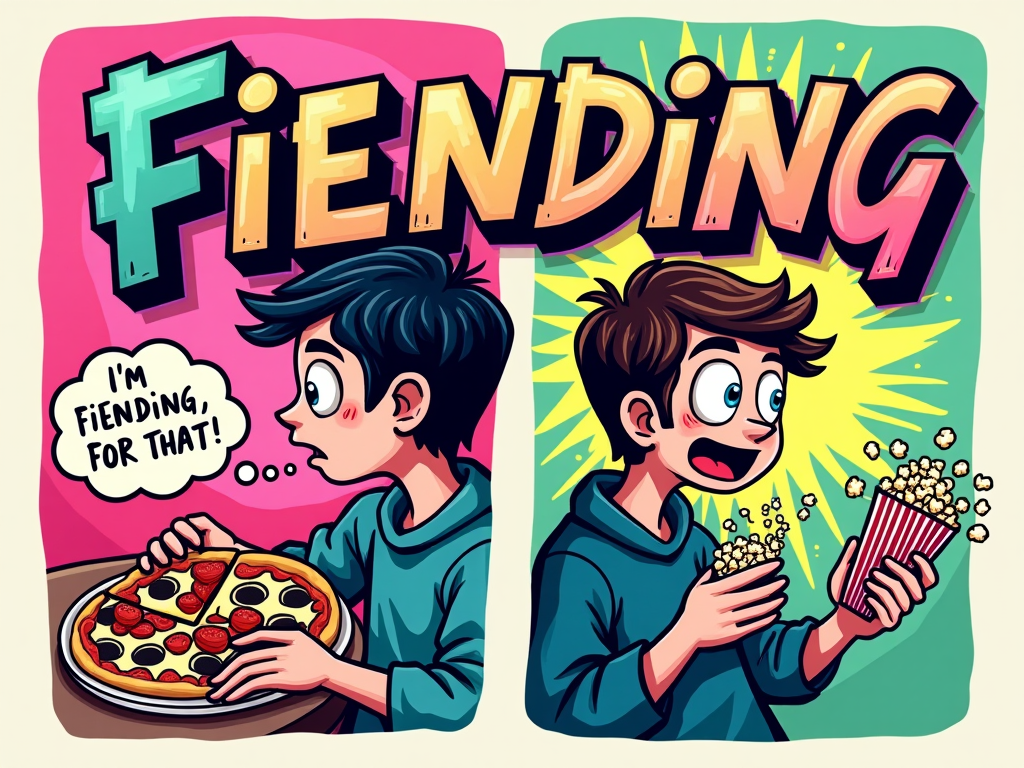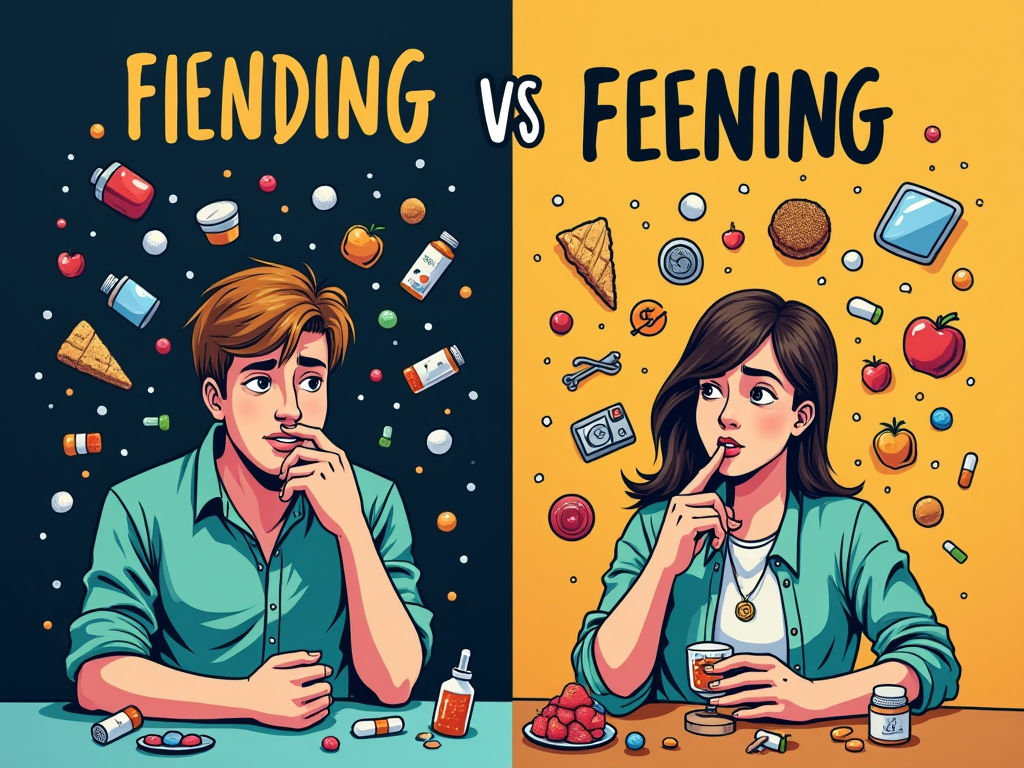Yo, what’s good? Let’s talk about fiending – a word that’s been bouncing around in our slang vocabulary for ages. 😬 Whether you’ve heard it in a rap song, seen it in a meme, or your friend just said they’re fiending for some pizza, this term packs a punch. It’s not just about wanting something; it’s about craving it so bad you can almost taste it. So, let’s break it down and figure out what people really mean when they say they’re “fiending” for something.
| Key Takeaways | Meaning |
|---|---|
| Origin | From “fiend,” evolved from describing evil to intense desire |
| Primary Meanings | Intense craving, addiction-related behavior, strong desire |
| Usage | Originally drug-related, now used for various strong desires |
| Cultural Impact | Popular in music, especially hip-hop, and youth culture |

What Does Fiending Mean?
Alright, let’s get real for a sec. “Fiending” isn’t just about wanting a snack or feeling a bit peckish. Nah, this word is all about that can’t-think-about-anything-else kind of desire. It’s like when you’re so hungry, your stomach’s doing backflips, and all you can think about is that juicy burger. That’s fiending, but cranked up to eleven.
The Evolution of Fiending
Back in the day, if you called someone a fiend, you weren’t paying them a compliment. We’re talking old school English, where a fiend was basically a demon or a super evil dude. Fast forward to now, and it’s all about desire. Here’s how it went down:
- Old English: “That guy’s a fiend!” (Meaning: He’s evil incarnate)
- 1800s: “He’s a fiend for knowledge.” (Meaning: He’s obsessed with learning)
- Today: “I’m fiending for some tacos!” (Meaning: I really, really want tacos)
Also read: MOXIE
Fiending Meaning
Let’s break it down, shall we?
- Intense Craving
This is the big one. When you’re fiending, you’re not just hungry or interested. You’re consumed by desire. It’s like your brain’s stuck on repeat, and all it can say is “I need this NOW!”Example: “He’s fiending for his next hit of nicotine. Quitting smoking is tough!” - Addiction-Related Behavior
Originally, fiending was all about drugs. It described that desperate need an addict feels when they’re jonesing for their next fix. It’s not just mental; it’s physical too. We’re talking sweats, shakes, the whole nine yards. - General Strong Desire
These days, you’ll hear people fiending for all sorts of things. It could be food, a new video game, or even attention from their crush. It’s a way of saying, “I want this so bad, it’s driving me crazy!”Example: “I’m fiending for the new Spider-Man movie. Can’t wait for it to drop!”
Fiending or Feening?
Now, here’s where it gets interesting. You might see this word spelled two different ways: “fiending” or “feening.” What’s the deal?
- Fiending: This is the original spelling, coming from “fiend.”
- Feening: This spelling popped up later, probably because of how people pronounce it.
Here’s a quick breakdown:
| Spelling | Pronunciation | More Common In |
|---|---|---|
| Fiending | FEE-nding | Written form, more “correct” |
| Feening | FEE-ning | Spoken form, casual writing |
Honestly? Both are used pretty interchangeably these days. It’s like the “tomato, tomahto” of slang. Use whichever feels right to you, but maybe stick to “fiending” for your English essays, just to be safe.
Also read: SPUNKY
Fiending for Something

When someone says they’re “fiending for” something, they’re putting a spotlight on that craving. Let’s look at some contexts:
- Drug Context
This is the heavy stuff. When someone’s fiending for drugs, it’s not just a want; it’s a need. Their body and mind are screaming for it. It’s the dark side of addiction, and it’s no joke. - Non-Drug Usage
On a lighter note, people use “fiending for” to describe intense but harmless desires too. Like when I’m fiending for my mom’s homemade cookies. (Seriously, they’re that good. 🍪)Examples:- “I’m fiending for some good news. This week’s been rough.”
- “He’s fiending for likes on his latest post. Social media addiction is real!
The key difference between fiending and regular old wanting? Intensity. When you’re fiending, it’s all you can think about. It’s like your brain’s got tunnel vision, and whatever you’re fiending for is at the end of that tunnel.
Alright, let’s dive back into the world of “fiending” and explore how this term has made its mark in popular culture and everyday language.
“Fiending” in Popular Culture

You can’t talk about “fiending” without mentioning its strong presence in music, especially hip-hop. 🎤 One of the most iconic examples is the song “Microphone Fiend” by Eric B. & Rakim. In this track, Rakim describes his intense craving for the microphone, likening it to an addiction[5]. This metaphorical use of “fiending” highlights the deep passion and unyielding desire that the term encapsulates.
- Music Influence: Hip-hop artists frequently use “fiending” to describe everything from a love for music to a need for material wealth or success. It’s become a staple in lyrics, helping convey the intensity of their desires.
- Social Media: On platforms like Instagram and TikTok, you’ll see people saying they’re “fiending” for everything from new sneakers to the latest viral trend. It’s a way to express that burning desire in a fun, relatable way.
Fiending vs. Feening

Now, let’s tackle the spelling debate: “fiending” vs. “feening.” While both are used, “fiending” is considered the correct spelling, originating from the word “fiend.” However, “feening” has emerged as a dialect variation, often used interchangeably in casual conversation.
Here’s a quick comparison:
| Spelling | Context | Usage |
|---|---|---|
| Fiending | Formal and informal | More widely accepted |
| Feening | Informal, dialectal | Common in certain regions |
Both versions capture that same sense of intense craving or obsession, so which one you use might just depend on where you’re from or who you’re talking to.
Also read: NSFW
Fiending for Something
When someone says they’re “fiending for” something, they’re not just expressing a mild interest. It’s more like an all-consuming need:
- Drug Context: Originally, fiending described the desperate craving an addict feels. It’s about that urgent need for a fix, whether it’s drugs or something else that’s become an obsession.
- Non-Drug Usage: Nowadays, people might say they’re fiending for more everyday things. Like when I’m fiending for my favorite band’s new album drop – it’s all I can think about until I finally hear those sweet tunes!Examples:
- “I’m fiending for some sushi right now.” 🍣
- “She’s fiending for attention with all those selfies.”
How to Use “Fiending” in Conversation
Using “fiending” can add some flair to your conversations, but here are a few tips to keep it cool:
- Context Matters: Make sure it’s clear what you’re fiending for. Saying you’re fiending without context might leave people scratching their heads.
- Keep It Light: While it has serious origins, using it casually can add humor or emphasis to your point.
- Know Your Audience: Not everyone might be familiar with the term, so gauge your audience before dropping it into conversation.
Also read: Mooning
In conclusion, whether you’re fiending for food, music, or just a little peace and quiet, this slang term is all about expressing that deep-seated desire we all feel from time to time. And if you’re curious about other slang terms like jaded or thirst trap, there’s always more to explore in the ever-evolving world of language!






